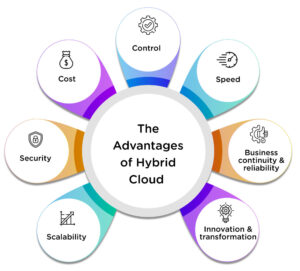Managing IT systems is a problem for businesses today. The greatest aspects of both private and public clouds are combined in hybrid cloud computing to provide a solution, which is also known as mixed cloud. It lets businesses save costs, safeguard private information, and increase resources as needed. Regardless of your company’s size, it helps you remain competitive and ready for the future.
This blog post will explore the top seven advantages of mixed cloud computing and how it may revolutionize your workflow.
What is Hybrid Cloud?
Hybrid cloud enables firms to manage their data and apps across various environments. This happens by combining public and private cloud services. With this adaptable paradigm, companies may benefit from public clouds’ scalability and cost-effectiveness. They can even retain the protection and control provided by private clouds.
The Advantages of Hybrid Cloud
1. Scalability
One of the biggest challenges with a private network is the cost of setting up, maintaining, and growing your infrastructure. Before cloud services, a business could only expand its IT system if it had a sizable amount of money, enough to buy more physical equipment.
It is simpler to run more complicated and resource-demanding apps and add additional processing power with public cloud possibilities by utilizing a hybrid cloud configuration. You may leverage the cloud service’s resources without waiting to purchase many servers till you have the money.
2. Security
Your company may benefit from both the power and possibilities that are usually associated with public clouds and the security that comes with private clouds by using a hybrid cloud infrastructure. It is likely that data kept in a private cloud environment will still need to be transmitted to the public cloud for processing and utilization by analytics systems, apps, and other procedures.
However, using encryption techniques to guarantee the data remains secure during this procedure is rather simple in a mixed cloud environment. The IT staff has several choices for enhancing the security of data storage and transit with a hybrid cloud.
3. Cost
It frequently contributes to long-term cost reductions, giving an organization’s budget more leeway. During the expansion phase, the business saves money since scaling a mixed cloud upward is simpler and less costly. Additionally, the organization may develop and produce more revenue sooner because scaling is easier to do. Purely on-site storage may impede expansion, which raises opportunity costs as the business loses out on possible revenue.
The ability to lower the potentially crippling expenses of moving digital assets between two separate cloud providers is another significant benefit of storing critical data in the private area of a hybrid cloud setup. For instance, if you are utilizing a multi-cloud architecture, you might need to pay termination costs prior to moving your data across silos. Additionally, there are cloud providers that charge extra to transfer your data. Its infrastructure eliminates these costs.
4. Control
Its main advantage is control. The private side of your cloud model may be tailored to your organization’s needs rather than entrusting all aspects of your IT infrastructure to a third-party supplier. You may assign less important or urgent activities to different areas of your mixed cloud.
Additionally, it is simpler to modify the infrastructure components that should manage each application and procedure when using a hybrid approach. It could be necessary to sign new contracts with suppliers or buy new equipment in order to achieve sufficient agility when using multi-cloud or fully on-site solutions. You may avoid these types of expensive or complex procedures by using a hybrid cloud.
5. Speed
Gaining control over your network’s resources also means faster speeds. Despite not being faster than a public or multi-cloud system on its own, a hybrid cloud environment enables IT professionals to optimize the network in ways that lower latency and streamline the data transfer process. Additionally, a hybrid architecture allows you to use edge computing’s capability, which may speed up your overall IT infrastructure.
In contrast to private clouds, which may be tailored to use resources as efficiently as possible, public clouds are compelled to distribute their resources throughout their user portfolio. This type of improved control can save important processing time, especially if each program is installed in an environment sector that is tailored to its needs.
6. Business continuity and reliability
In the event of an emergency, business continuity—the ability to continue essential operations—is a concern for all enterprise organizations. Disaster recovery (DR), a component of business continuity planning, focusses on resuming data access and IT infrastructure following a disaster, such as a natural disaster that disrupts network connectivity or a military strike that creates outages.
Through the integration of cloud resources and local storage, a hybrid cloud architecture helps disaster recovery by enabling enterprises to backup critical data. If one backup fails, this redundancy keeps the data safe. Due to the constant replication and refresh of data, which guarantees data integrity, precision, consistency, and dependability, mixed clouds also expedite disaster recovery.
7. Innovation and transformation
Without a doubt, hybrid cloud architectures facilitate new technologies and business change. When paired with other transformation levers, the anticipated value of mixed cloud investments may increase by up to three times, according to a recent IBM Institute for Business Value paper titled Mastering Hybrid Cloud. The value multiplier for some sectors can reach 20x.
The process of upgrading historical programs to cloud-native application environments, or application modernization, is made possible by the flexibility, scalability, and efficiency of mixed cloud infrastructure. This is an essential component of digital strategy for corporate transformation.
In addition to updating outdated software, companies are keen to use generative AI and machine learning for automation, customer support, and other purposes. Generative AI depends on vast data, high processing power, sophisticated security, and quick scalability – all benefits of hybrid cloud computing.
The Bottom Line: Hybrid Cloud Empowers Your Business!
The hybrid cloud strategy is changing how companies handle their IT requirements. By combining the protection of private clouds with the flexibility of public clouds, it provides a dependable means of cutting costs, increasing speed, and maintaining security. Additionally, it offers resources for experimenting with new technology and rapidly recovering from calamities. It is revolutionary for companies looking to remain competitive and prepared for the future since it offers stability and expansion prospects.
For more helpful and knowledge-giving content, keep visiting us at HiTechNectar.
Recommended For You:
Hybrid Cloud: The Benefits of both Public Cloud as well as Private Cloud



